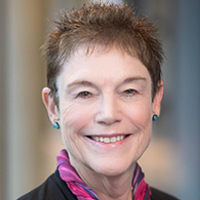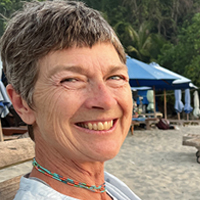March 1st, 2024
In this interactive Viewpoint session, Stories Rooted in Healing the Planet, our panelists Dr. Elin Kelsey, Dr. Sara Florence Davidson and Dr. Bonny Norton with Dr. Liam Dohorty shared their unique perspectives and approaches to children’s books that weave in themes of climate justice, the environment, animals, and more.
Panelists

Dr. Bonny Norton, Professor, Language & Literacy Education (LLED)
Dr. Bonny Norton (FRSC) is a University Killam Professor and Distinguished University Scholar in the Department of Language and Literacy Education, UBC. Her primary research interests are identity and language learning, critical literacy, and the Global Storybooks project. She is a Fellow of the Royal Society of Canada and the American Educational Research Association, and was elected BC Academic of the Year in 2020. Her website is: http://faculty.educ.ubc.ca/norton/

Dr. Liam Doherty, Sessional Lecturer, Department of Asian Studies
Dr. Liam Doherty is a language educator teaching in the Department of Asian Studies and a Research Associate in the Department of Language and Literacy Education at UBC, with a particular interest in digital literacy and multilingualism, corpus linguistics, translation and identity, language socialization and heritage language learning, and the use of open data-driven digital tools to help better understand, learn, and teach languages.

Dr. Sara Florence Davidson (sgaan jaadgu san glans), Assistant Professor, UBC Language Sciences
Sara Florence Davidson (sgaan jaadgu san glans) is a Haida/Settler Assistant Professor in the Faculty of Education at Simon Fraser University. She has a PhD in Literacy Education, and her research focuses on Indigenous pedagogies, literacies, and stories. With her father, she is the co-author of Potlatch as Pedagogy: Learning through Ceremony and the Sk’ad’a Stories, a picture book series which is based on family stories and highlights Indigenous pedagogies and intergenerational learning.

Dr. Elin Kelsey, Adjunct ProfessorAdjunct Professor
University of Victoria
Elin Kelsey, PhD is an award-winning author, speaker and thought-leader for the evidence-based hope and climate justice solutions movement. Kelsey’s influence can be seen through the popularity of her book, Hope Matters: Why Changing the Way We Think Is Critical For Solving The Environmental Crisis (2020). A best-selling children’s book author, her picture books reveal the intimate connections between humans and the greater than human world. For more, please visit https://www.elinkelsey.org.
Facilitators
Jamilee Baroud, Curriculum and Evaluation Consultant, LDDI
Recording
Summary
* This summary was generated using HARPA AI and subsequently edited by the LDDI team.
- Dr. Sarah Florence Davidson introduces herself, highlighting her Haida ancestry and her work on indigenous pedagogies and stories.
- Dr. Davidson discusses “Magical Beings of Haida Gwaii,” a collaboration with her stepmother that focuses on traditional supernatural beings reimagined for younger audiences.
- Dr. Davidson shares “Returning to the Yakoun River,” a story about intergenerational learning and connections with nature, emphasizing the importance of protecting the environment and preserving traditions.
- Dr. Elin Kelsey discuss climate emotions and resilience and highlight the interconnectedness of humans with other species and nature, emphasizing the need for evidence-based hope and community engagement.
- Dr. Kelsey discusses research-based storytelling and emotional connections with nature with an emphasis on resilience, community, and positive shifts in environmental perspectives.
Shedding toxic myths of disconnection from ourselves, others, and the planet is a crucial opportunity for a brighter future. - Dr. Bonny Norton with Dr. Liam Dohorty discuss the Global Storybooks Project shares freely available stories from diverse cultures worldwide to promote information sharing and cultural understanding.
- The Global Storybook Project features stories in various languages, including African languages, Indigenous languages, Spanish, French, Arabic, German, and Swahili, fostering a global dialogue and cultural exchange.
- A storybook highlighted from the project is, “A Tiny Seed,” which is about Wangari Maathai, a Kenyan scholar and activist who won the Nobel Peace Prize for her reforestation work, inspiring global environmental action.
- The Global Storybook Project emphasizes sharing stories from diverse perspectives, challenging global information norms, and promoting inclusive storytelling for climate justice.
- Effective storytelling for climate justice connects with readers’ hearts and minds, immersing them in experiences that inspire action and promote cultural understanding.
- Stories have the power to connect minds and hearts, providing unique opportunities for learning and growth, especially in educational settings.
- Recognizing our attachment to place and our connection to the land and other species is crucial for navigating emotions around climate justice.
- Embracing a solutions-oriented approach allows us to share the difficulties of our times while envisioning a promising future and encouraging diversification of perspectives and storytelling.
- Science’s diversification leads to a better understanding of other species, challenging previous misconceptions and contributing to a more holistic approach in our work and understanding.
- Balancing narratives between highlighting problems and showcasing solutions is crucial for addressing eco-anxiety and fostering meaningful engagement with climate issues.
- Solutions journalism plays a vital role in presenting a more balanced narrative by reporting not only on what’s broken but also on the steps being taken to address challenges.
- Recognizing and sharing stories that go beyond highlighting problems to include solutions, recovery processes, and diverse perspectives can help in coping with tough issues and fostering a sense of meaningful purpose.
- Leveraging technology, such as creating interactive storytelling platforms and utilizing digital tools, can enhance engagement, foster curiosity, and promote stewardship of the environment.
- Cynicism, skepticism, and apathy often arise due to issues like institutional betrayal, leading to feelings of despair and helplessness.
- Disengagement can result from deep concern, which may be misunderstood, leading to a cycle of disempowerment instead of meaningful engagement.
- Climate concerns are interconnected with wider social issues and global institutions’ roles, necessitating a holistic approach to address these challenges effectively.
- Evidence-based hope is crucial, supported by initiatives like Net Zero, and accountability measures, highlighting the importance of ongoing efforts and progress tracking.
- Youth’s prioritization of climate justice reflects a growing awareness of systemic injustices, shaping dominant values and narratives globally.
- Accessibility in storytelling, through mediums like picture books and music, plays a vital role in sharing diverse knowledge and experiences, fostering inclusivity and co-constructed meanings.
- Challenges in accessibility extend beyond humans, emphasizing the need to include diverse perspectives, cultural understandings, and ecosystem perspectives in knowledge sharing.
Resources
- Elin Kelsey and Company Website
- Bonny Norton Website
- Storybooks Canada
- Sara Florence Davidson Website
Books discussed
Dr. Norton and Dr. Dohorty
Dr. Elin Kelsey
Dr. Sara Florence Davidson